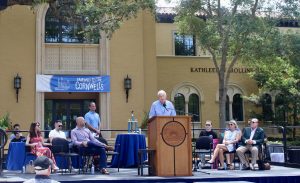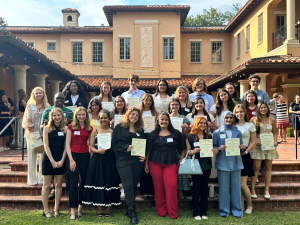One of the most admirable and rewarding acts is to provide someone else with something you have, something they might not otherwise be lucky enough to receive. Graduating from college affords students this opportunity, and five Rollins students, all of whom are seniors in the class of ‘13, are making the most of that chance.
Roxy Szal, Melissa Manley, Sarah Mills, Carlee Hoffman, and Amy Uhl took the first step towards this goal by applying for highly competitive Teach For America positions. Even more notably, all five students gained acceptance into the program, significantly beating the odds of the national acceptance rate which typically hovers just around 10 percent.
Teach For America is a non-profit organization whose mission, according to their website, is to “eliminate educational inequity by enlisting high-achieving recent college graduates and professionals to teach” for at least two years in low-income communities throughout the U.S.
All five students gained acceptance into the program, significantly beating the odds of the national acceptance rate which typically hovers just around 10 percent.
The application process is a rigorous one: it is first comprised of an online application, followed by a phone interview, and a two-hour online activity. As finalists, each of the applicants were required to travel to either Jacksonville or Gainesville to complete an all-day interview, including undergoing a personal interview, teaching a five-minute lesson plan, and engaging in group activities.
Three of the five students have decided to accept their offers from TFA – offers which come inherently attached to an assigned placement in one of close to 50 locations around the country. Szal, Manley, and Mills, whose respective placements are located in the Rio Grande Valley in Texas, Chicago, and North Carolina, will be going through teacher certification process before beginning their work in the classroom, including the five-week summer training program. Although the other two, Hoffman and Uhl, assigned to New Orleans and Jacksonville, respectively, are declining their offers, they will instead be participating in different gap-year teaching programs.
The teaching position is not an easy one, often requiring many extreme social and environmental changes. When asked why she decided to apply and subsequently accept the job offer, Szal expressed a cautious and realistic attitude, but still remained notably enthusiastic: “There are a lot of things I could have done after college, but I was looking for a way to use the skills I was given to make some meaningful change. I know the job is going to be hard on me emotionally because the educational gap is going to turn into something I have to face and fight in my classroom every single day, not just something I read or learn about… But if I can even make a slight impact down in the Rio Grande Valley to try to close the educational gap a little and make my students feel more confident, I think I would consider myself successful.”







Be First to Comment